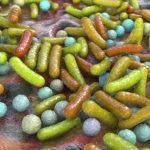By David Blyweiss, M.D., Advanced Natural Wellness
May 03, 2013
- The “secret society” living in your gut
- Can THIS increase your risk of stroke, cancer, heart disease and more?
- Delicious foods that restore a healthy balance
Back in the day, a process called “fermentation” kept our guts happy and healthy. This method of food preservation used healthful bacteria to prevent food spoilage. And it was good for us!
It introduced nourishing and beneficial bacteria into the digestive tract. This helped prevent harmful microbes from running unchecked throughout our bodies.
Our grandparents were able to introduce plenty of these health-giving microorganisms into their diets. That’s because they still canned their own foods, drank cultured milk and enjoyed naturally fermented beer.
But today we don’t get nearly enough of these noble fighters into our guts.
We no longer use fermentation to prevent spoilage. Our food supply is now preserved with chemicals, pasteurized and irradiation. Whatever good bacteria they may have had in them to start with are completely stripped away.
MD Exposes the Hidden Danger to Your Eyes

When your eyesight starts to fail, it's a real problem. Suddenly you can't go to the grocery store... you can't get to the doctor if you have an emergency... you can't meet your friends for dinner…
Your "regular" doctor doesn't have time to keep up with the latest research. And the same goes for eye doctors. They go to school to learn how to fit you for glasses and contacts, but have no way of preventing the damage and loss of eyesight that threatens your freedom and independence.
Let me show you something that explains a LOT about how your eyes work.
In my FREE Special Report, I'll show you a HUGE, untapped resource for your eyes that safely and naturally restores clear, effortless eyesight.
Click here to get started...
And when it comes to promoting a healthy bacterial balance in the body, most of my patients cite yogurt as their number one source.
I’d love to chalk this up as a win. After all, good, old-fashioned yogurt is filled with all kinds of good bacteria. That, in turn, supports a strong and healthy microbial balance in your gut.
Unfortunately, the yogurt found on most grocery shelves today isn’t “good.” And it’s not “old-fashioned.”
Instead, you will probably find most of them filled with preservatives, sugars, colorings and other additives. Worse yet, as the shelf-life of these products expire, so does the probiotic activity.
Given the popularity of yogurt products, that’s very disappointing. And here’s why…
There’s a secret society living in your gut. Scientists are calling it the “gut microbiome.”
And today researchers are finding it may have a huge influence on your health.
You see, your body contains somewhere around ten times more bacterial cells than human cells. Most of these bacteria live in your gut. Some of them are good for you, others aren’t. When the “bad guys” take over, it can make the difference between a long and healthy life and one that is filled with complications.
Are You Suffering From...
- Love handles and a pot belly
- Romance that isn't what it used to
- Forgetfulness and inattention
- Low (or no) strength and endurance
- A sex drive that's shifted into neutral...or worse
If so...you may have Mature Male Burnout. Click here to discover more about this unique condition and what you can do about it.
I’m not just talking about digestive health and bowel disorders here. Conditions associated with an imbalanced microbiome include heart disease, obesity, type 2 diabetes, cancer and more!
- Stroke and heart disease. Research out of Sweden tells us microbial imbalances in your gut may have severe consequences to your cardiovascular health. You see, the bacteria living in your gut has been linked to both hardening of the arteries and stroke. Patients who have these conditions have very different gut flora than those without them.
- Diabetes. Here’s another interesting find. When researched compared gut bacteria in diabetics guess what they discovered? Diabetics have a different population of gut bacteria then non-diabetics. It’s believed the inflammation caused by the imbalance sets the tone for diabetes. It may also be a factor in insulin resistance.
- Obesity often goes hand in hand with diabetes. And once again, microbial imbalances may be the culprit. While I haven’t heard of any studies of this kind on people yet, one study shows when intestinal bacteria from obese mice is introduced into the microbiome of normal weight mice, it makes the thinner mice gain weight. Even without any change of diet!
- Colon cancer is also linked with changes in the gut microbiome. Numerous studies have made the connection. In one of the larger studies, researchers took bacteria from 179 colonoscopy patients. The dominant types of bacteria in patients with colon cancer were significantly different from those without cancer.
While the micriobiome in your gut may not be the only contributing factor to these conditions, it certainly adds to the risk. With that in mind, there are some simple ways you can boost healthy intestinal flora to keep you healthier, longer.
Restoring a healthy balance of bacteria in your stomach is something that should occur daily. But with today’s packaged, processed and chemically preserved foods it can be hard to do.
However, there are still ways to find fermented foods. Here are some that you can try…
Miso and natto are fermented soy products loaded with good bacteria. You can add miso paste to a variety of dishes, including miso soup (of course!). Or try natto topped with chopped green onion, grated daikon radish and a few dashes of shoyu, which is a fermented soy sauce. You get these in Asian markets and health food stores.
Kimchi is a spicy Korean dish. It’s made using fermented vegetables such as cabbage, radishes and hot peppers. You’ll find it at Korean restaurants. Or get creative! Try experimenting with online recipes at home.
Another popular fermented food is tempeh. It’s a patty made from fermented soybeans. I like using it in stir fries. But it’s also good when it’s crumbled into sauces, stews and soups.
Other fermented foods you may be more familiar with include sauerkraut, kefir and yogurt. However, if you decide to go the yogurt route I have a word of advice. Please stick with plain Greek yogurt that doesn’t have a bunch of sugars and other additives. Top it with fresh fruits and nuts to add flavor.
It can also help to take a probiotic supplement every day. They not only help keep your digestive system on track. They also help lower your cholesterol levels, improve blood pressure and increase insulin sensitivity.
Look for a probiotic that contains several different strains of beneficial bacteria. You want a good mix of Lactobaccillus acidophilus, L.bulgaris, L. bifidus and Streptococcus faeceum.
And when it comes to probiotics, more is better. Find a supplement that provides at least 5 billion colony forming units (CFUs) and take it every day.
Resources:
Kinross JM, Darzi AW, Nicholson JK. Gut microbiome-host interactions in health and disease. Genome Med. 2011 Mar 4;3(3):14.
Changes in the gut bacteria protect against stroke. University of Gothenburg The Sahlgrenska Academy. Nov 5, 2012.
Nadja Larsen, Finn K. Vogensen, Frans W. J. van den Berg, Dennis Sandris Nielsen, et al. Gut Microbiota in Human Adults with Type 2 Diabetes Differs from Non-Diabetic Adults. PLoS One. 2010; 5(2): e9085.
Kallus SJ, Brandt LJ. The intestinal microbiota and obesity. J Clin Gastroenterol. 2012 Jan;46(1):16-24.
Sobhani I, Tap J, Roudot-Thoraval F, Roperch JP, Letulle S, et al. Microbial dysbiosis in colorectal cancer (CRC) patients. PLoS One. 2011 Jan 27;6(1):e16393.






